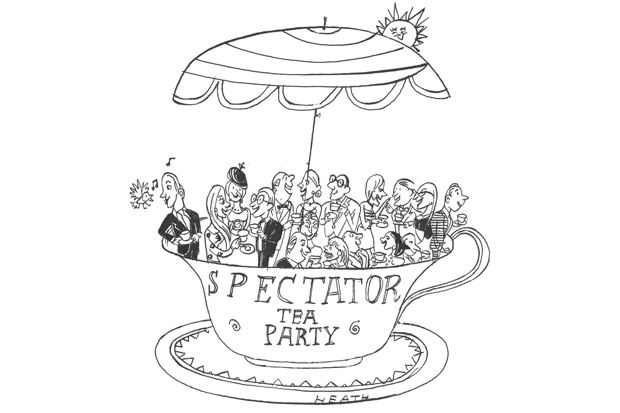Every summer this magazine invites some of its (randomly selected) subscribers to tea in the garden. Every Englishman loves tea and the pages of English literature are richly adorned with tea-time scenes.
Perhaps the most gluttonous teas are to be found in Daphne du Maurier’s Rebecca. From her exile abroad, the narrator remembers tea-time at Manderley with relish: ‘Those dripping crumpets, I can see them now. Tiny crisp wedges of toast, and piping-hot, flaky scones. Sandwiches of unknown nature, mysteriously flavoured and quite delectable, and that very special gingerbread. Angel cake, that melted in the mouth, and his rather stodgier companion bursting with peel and raisins.’
Tea at Manderley is not only sumptuous, it is unchanging. Served rigidly at half-past four, it is a ‘solemn ritual’, which ‘went forward as it always did, day after day’. When the novel begins, however, we gather that Manderley is resolutely in the past, revisited only in dream and memory, yet still the narrator persists in taking tea in their hotel abroad, where alas it has dwindled to a cup thereof, accompanied by a meagre two slices of bread and butter.
Ritual and a sense of order are paramount to tea. One of the most common words to follow it is ‘things’, suggesting all the accompanying paraphernalia — pot, cups, strainer, spoons — required to carry out the ritual in the complicated manner tradition dictates. It is in flouting this expected sense of order which makes one of literature’s most notorious tea parties quite so enchanting. In Alice in Wonderland, when our protagonist comes across the Hatter, the March Hare and the Dormouse having tea, it is chaos:
‘Take some more tea,’ the March Hare said to Alice, very earnestly.
‘I’ve had nothing yet,’ Alice replied in an offended tone, ‘so I can’t take more.








Comments
Join the debate for just £1 a month
Be part of the conversation with other Spectator readers by getting your first three months for £3.
UNLOCK ACCESS Just £1 a monthAlready a subscriber? Log in